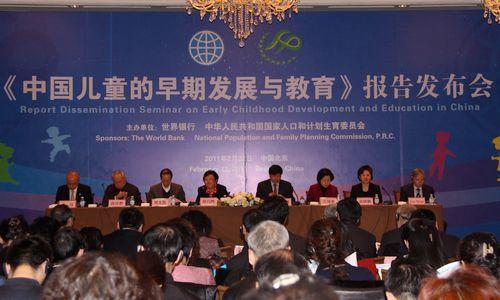
Report on Early Childhood Development and Education in China: Break Poverty Generational
Transmission and Improve Future Competitive Capability was disseminated.
On 22 February 2011, Report Dissemination Seminar on Early Childhood Development and Education in China: Break Poverty Generational Transmission and Improve Future Competitive Capability was held in Beijing. The report was the result of the cooperation between the World Bank and the National Population and Family Planning Commission of China (NPFPC).
The report put forward that China should include early childhood development into government plans for poverty alleviation, especially early childhood development for the extremely poor families, and the early development for children of 0-6 years old into the framework of public services. Mr. Zhuang Guorong, Vice Chairman of Committee of Population, Resources and Environment of the Chinese People s Political Consultative Conference (CPPCC), Mr.
Zhu Guangyao, Vice Minister of Finance, Dr. Zhao Baige, Vice Minister of NPFPC, Mr. Zheng Wenkai, Deputy Director of the State Council Leading Group Office of Poverty Alleviation and Development of China (LGOP) and Mme. Meng Xiaosi, Vice President of All-China Women' Federation attended the seminar and made speeches.
The seminar aimed at exchanging opportunities, challenges and countermeasures in front of early childhood development in China and exploring ways to make early childhood development the basic work for enhancing China s future work force and competitive capability and an important step for China to become a country with rich human resources from a country with huge population.
Experts from the World Bank indicated that early childhood development and education possessed great significance to poverty reduction and improvement of child welfare. According to World Bank evaluation, early childhood development and education were not only their rights but also a highly cost-effective investment.
The cost-effectiveness of early childhood development and education was 7-18%, much higher than that of financial investment.
Vice Minister Zhao Baige pointed out in her speech, scientific evidences of early childhood development in the past ten years and experiences of various countries showed that early childhood stage was a key period for the development of their life and childhood experience would lay the key foundation for their life course.
Childhood development was the integrated and coordinated development of body, psychology, feeling, language, behavior and social ability. Life experiences and practices of children during their early stages would be of great significance for the formulation of their intelligence, character and social behavior and was the key and base to influence and determine the health and happiness of their entire life.
The transition of population reproduction pattern in China had provided the opportunity for comprehensively addressing population issues and promoting early childhood development, but there were still many problems in front of early childhood development, such as unformed social consensus, limited input of resources, insufficient coverage and lack of opportunities for children in the rural areas, especially in the poverty-stricken areas.
Vice Minister Zhao emphasized that there were 16 million new births annually in China currently and the total number of children of 0-6 years old was about 100 million. Early childhood development was an important link to improve the quality of life of China s population and to stride from a country with large population to a country with rich human resources, and the first step for China to realize sustainable economic growth and development in the future.
China s population programme would coordinate related departments, policies and social resources, make use of the network for grassroots population work and public service platforms to comprehensively, systematically and scientifically promote early childhood development and education with such main contents as physiology, psychology, behavior habit and adaptive capacity to society, and increase input and service to the rural areas, especially the poverty-stricken areas, in development for poverty alleviation and ability-building for family development, in an effort to benefit the society and more families.
About 100 participants attended the seminar, including Mr. Duan Yingbi, President of China Foundation for Poverty Alleviation, World Bank Senior Vice President and Chief Economist Justin Yifu Lin, officials from related government departments and representatives from the World Bank, UN agencies, some embassies in China and international NGOs.
Related News
Photos
More>>trade
market
finance
- Gansu, OCAOSC sign cooperation agreement
- Governor Liu Weiping meets with Zeng Yinquan
- The Fourth Session of the 11th Gansu Provincial People s Congress grandly opens
- The Fourth Session of the 10th Gansu Provincial Committee of the CPPCC grandly
- 300 Million Ton Oil Refining Project Puts into Production





